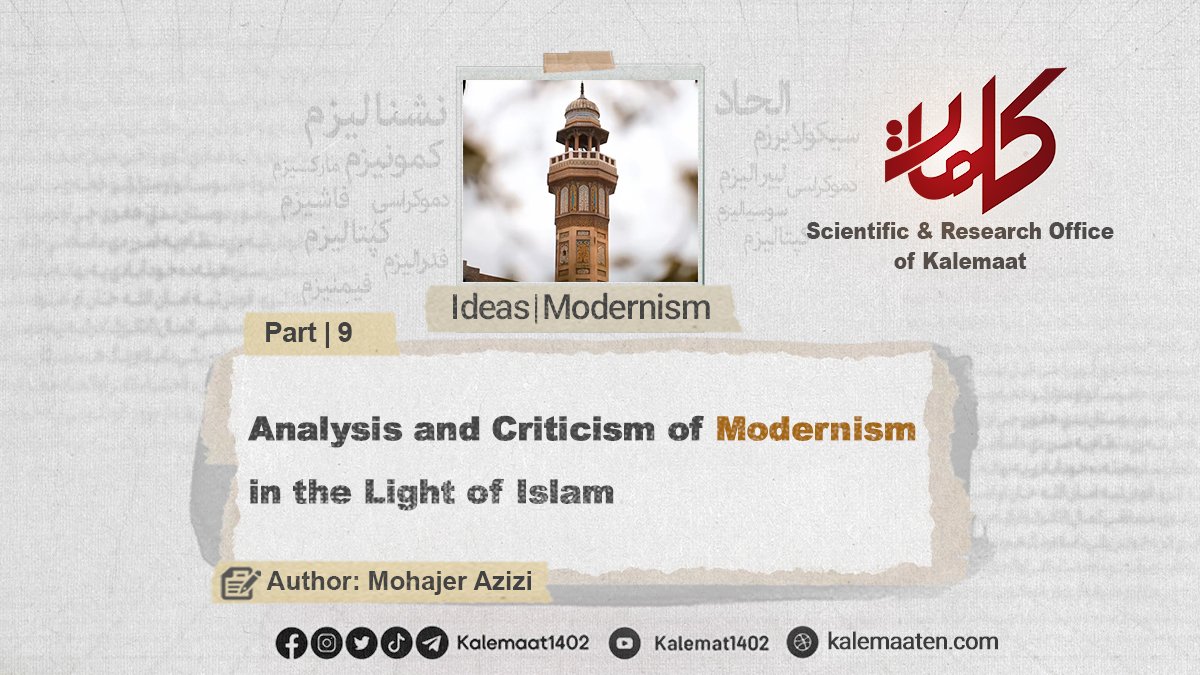Author: Mohajer Azizi
Analysis and Criticism of Modernism in the Light of Islam (Part 9)
Modernism-Related Terms
-
Progressivism
Progressivism, which is considered a core intellectual foundation of modernism, is an intellectual, social, and political school of thought that believes human society is always on a path of growth and development. By utilizing science, reason, education, and social and political reforms, it seeks to achieve justice, freedom, prosperity, and the improvement of human life.
This school of thought usually criticizes long-standing traditions and emphasizes innovation, transformation of social structures, equality of rights, and expanding the role of government in improving people’s lives. However, the Western perspective on progressivism views religion and spiritual foundations as causes of societal backwardness, seeking to remove them from human life.
Western progressivism is based on two main pillars: humanism and modern rationalism—that is, it revolves everything around human reason and will, considering religion and spirituality useless and ineffective in the process of societal growth and progress. Its ultimate goal is to achieve material prosperity, individual freedom, technological advancement, and complete domination over nature. In their view, morality is subject to personal interests and the shifting norms of the time, rather than being fixed and divinely ordained.
Undoubtedly, the West has taken great strides in certain areas such as empirical sciences, industry, and technology, succeeding in meeting many material needs of humanity. However, these cannot be considered signs of true human progress. The essence of real progress lies in the elevation of the spirit, moral growth, and the flourishing of spirituality.
Modernists take pride in their material possessions and look down on other nations with arrogance and self-conceit. Yet in the field of moral and spiritual values, they have fallen into a pit of decline and baseness, sinking deeper every day—a decline rarely seen in history. So deep is their immersion in deviation that sometimes their lives seem even more degraded than those of animals.
Is someone who has advanced only in technology and industry truly a “progressive,” complete, and modern human being?
Certainly not. A true and elevated human is one who, alongside material progress, has also advanced in the realms of morality and spirituality.
We can call a person with good morals, sound spirituality, and human compassion a “true human.” But someone who has developed only in industry and technology while abandoning the bounds of humanity does not deserve such a title. In reality, the essence of humanity lies in morality, modesty, and inner purity—not merely in technical knowledge and material progress.
-
The Difference Between the Concept of “Progress” in Islamic and Western Cultures
The concept of progress in Islamic thought differs fundamentally from what is common in Western culture.
In the West, progress means advancing in material and physical aspects to achieve worldly comfort. In Islam, however, a deeper term is used: growth (Roshd), which encompasses both the material and spiritual dimensions of human life. From an Islamic perspective, progress is genuine only when it is accompanied by moral, spiritual, and divine growth.
Islam does not accept the Western materialistic notion of development. If progress is purely material and devoid of spirituality, it can lead to tyranny, injustice, and monopolization of power. As history shows, so-called “advanced” countries like France and England, despite their industrial achievements, colonized nations in Asia and Africa—plundering their natural resources and committing countless crimes. Even today, they pursue the same goals through new methods. From the Islamic viewpoint, any progress built on oppression, colonization, and exploitation is not true progress—it is a form of decline and corruption.[1]
Even many European and American intellectuals, upon re-examining their own achievements, realized that what they once called “progress” was in fact nothing but emptiness and confusion. They have openly admitted: this material progress we have today is not real progress at all; it has distanced us from humanity. We speak of advancement while having committed some of the greatest crimes in human history—crimes our former enemies never committed. They preserved civilizations, whereas we destroyed them.
Thus, even Westerners themselves have challenged their one-sided, material progress, calling it not a sign of civilization but an embodiment of oppression, barbarism, and cruelty.
Undeniably, if the West appears advanced today, this advancement exists only in the material dimension. In the realms of spirituality, morality, and human ideals, not only has it failed to progress, but it is trapped in crisis and stagnation. For this reason, some Western thinkers have called this era the “Age of Anguish”—a time when modern man suffers from inner rage and spiritual pain, having lost the meaning of life.
In Islamic culture, progress is inseparable from justice. Meaningful progress is that which liberates a society from the clutches of colonialism, arrogance, and tyranny. Islam sees material and spiritual growth together; if material growth causes the neglect of human values, it ceases to be progress—it becomes decline.
Therefore, to prevent selfishness and materialism, Islam promotes values such as moderation in consumption, mutual assistance, and generosity in social behavior—keeping the spirit of solidarity and compassion alive in society. At the same time, economic growth and production are valuable only when they serve public welfare, not monopolization and exploitation.
Here, the difference between the Islamic and Western views of progress becomes clear, emphasizing the need for an Islamic model of progress—one rooted in the culture and authentic values of Islam.
In truth, Islamic culture approaches the concept of progress with a broad, holistic view, never limiting it to one dimension. Islam links progress to knowledge, reason, and divine revelation, seeing it not in severing ties with the past but in correctly guiding traditions, heritage, and earlier civilizations. Unlike Western modernists who view progress as a break from the past and abandonment of traditions, Islam believes in the continuity and elevation of civilizations, seeking progress through fidelity to principles while adapting to the real needs of human society.
Continues…
Previous Part / Next Part
References:
[1]. History of Islamic Culture and Civilization, p. 68.



